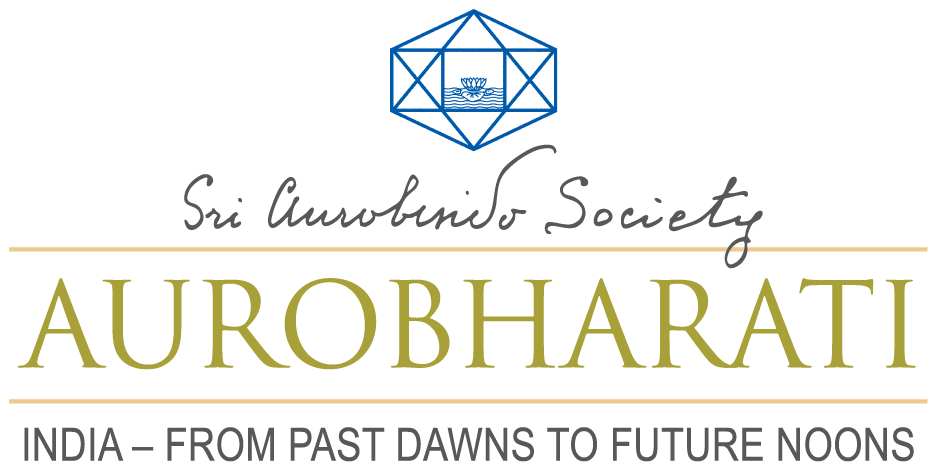India’s Contribution to the World of Democracy
Location: Online
Institute: AuroBharati
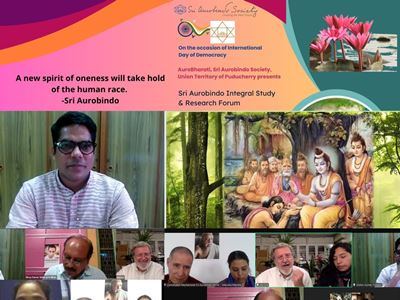 A new spirit of oneness will take hold of the human race. -Sri Aurobindo
A new spirit of oneness will take hold of the human race. -Sri Aurobindo
The world is preparing for a big change. Will you help? The Mother
“A widest and highest spiritualising of life on earth is the last vision of all that vast and unexampled seeking and experiment in a thousand ways of the soul’s outermost and innermost experience which is the unique character of [India’s] past; this in the end is the mission for which she was born and the meaning of her existence.”
– Sri Aurobindo
On the occasion of International Day of Democracy, Sri Aurobindo Society, Union Territory of Puducherry launched a new project Sri Aurobindo Integral Study & Research Forum. First edition of the forum held on the theme ‘India’s Contribution to the World of Democracy’ on 5th September, 2024.
On this occasion, Marcelo Fortuna Figueira Marques & Wanliza Marques Fortuna (Founder, CISAUM), Dr Ram Sharma (Principal, SSB PG College, Raniganj, Ballia, UP), Dr Walter Maverino (Renowned coach, consultant and writer), Shri Ramesh (Sri Aurobindo Bhavan, Bengaluru), Ms. Swetapadma Pati (Member, Eager to Force Ahead, Odisha), Dr Aniket Mohapatra (Academician, New Alipore College, University of Calcutta, West Bengal) and Dr Biswaranjan Rath (Founder, JagadGuru Yoga Bharat Foundation, Odisha) shared significant aspects of India’s contribution to the world of democracy.
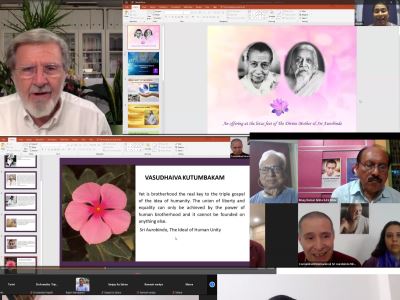 Speaking on the occasion, Dr Kishor Kumar Tripathy (Member Secretary, AuroBharati, Sri Aurobindo Society, said that Sri Aurobindo Integral Study & Research Forum, an initiative by AuroBharati, SAS and the central purpose of this forum is to take Sri Aurobindo’s and the Mother’s vision at a global platform. Through this forum, efforts will be initiated to connect the institutions and individuals globally for creative dialogue and understanding of the vision of Sri Aurobindo and the Mother. This will focus on institutional networking, research initiatives and community outreach programs for diverse geographical, ethnic, cultural and educational backgrounds.
Speaking on the occasion, Dr Kishor Kumar Tripathy (Member Secretary, AuroBharati, Sri Aurobindo Society, said that Sri Aurobindo Integral Study & Research Forum, an initiative by AuroBharati, SAS and the central purpose of this forum is to take Sri Aurobindo’s and the Mother’s vision at a global platform. Through this forum, efforts will be initiated to connect the institutions and individuals globally for creative dialogue and understanding of the vision of Sri Aurobindo and the Mother. This will focus on institutional networking, research initiatives and community outreach programs for diverse geographical, ethnic, cultural and educational backgrounds.
Dr Tripathy spoke about the importance of the International Day of Democracy to promote and strengthen democratic values. He mentioned about the international understanding of UN on Democracy ‘Democracy provides an environment for the protection and effective realization of human rights.’ Highlighting the contribution of India in the areas of democracy, Dr Tripathy said that India is the world’s largest democracy, with a long-standing commitment to democratic principles since gaining independence in 1947. Its democratic system serves as a model for other nations, particularly in regions with emerging democracies. Vasudhaiva Kutumbakam, One World One family.
Dr Tripathy highlighted Sri Aurobindo’s vision for the development of democratic values, including democratic traditions from the Vedas to the contemporary scenario; India’s advocacy for democracy in supporting the democratic governance in international forums; India’s role in developing the democratic institutions, including UN, BRICS, WHO, Non-Allign Movement and UN Democracy Fund (UNDEF) and support from democratic movements for the liberalization of the specific countries of Asia and Africa.
Dr. Ram Sharma, Principal of SSB PG College, Raniganj, Ballia, UP, said that India’s history with democracy dates back to the Vedas and the Chanakya era. He highlighted a few particular problems with India’s democratic system as well as the contribution of the Indian common man to the growth of socialism. He cited Sri Aurobindo’s writings on the Synthesis of Yoga and how the spirit of Indian democracy may contribute to both the advancement of India and the global community. He underlined that the Indian constitution also included important contributions from a few other nations and that the concepts must be put into practice in order to improve our understanding of mankind as a whole.
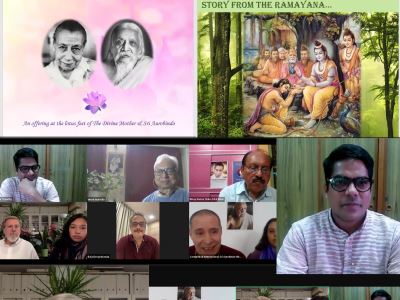 The democratic system of India was highlighted by Marcelo Fortuna Figueira Marques and Wanliza Marques Fortuna (Founder, CISAUM), along with Dr. Walter Maverino (Respected coach, consultant, and writer), with particular reference to the teachings of Sri Aurobindo and the Mother. India, the birthplace of Jnana, Vydia, and knowledge, can assist the world in realizing these principles to the fullest extent possible, enabling everyone to live rich and fulfilling lives capped by the joy of being Amrita—Sat, Chit, Ananda, the ecstasy of being.
The democratic system of India was highlighted by Marcelo Fortuna Figueira Marques and Wanliza Marques Fortuna (Founder, CISAUM), along with Dr. Walter Maverino (Respected coach, consultant, and writer), with particular reference to the teachings of Sri Aurobindo and the Mother. India, the birthplace of Jnana, Vydia, and knowledge, can assist the world in realizing these principles to the fullest extent possible, enabling everyone to live rich and fulfilling lives capped by the joy of being Amrita—Sat, Chit, Ananda, the ecstasy of being.
Sri Aurobindo said, “Mother India has always flourished in Eternity for all human peoples, not just for herself.” He further said that Great Beings, Avatars, and minds fed and enlightened by the Sanatana Dharma were born in it, established in the Truth of the Spirit. This has to be its unusual expression. Marcelo Fortuna Figueira went on to state that the exercise of power by the people, for the people, is the objective of democracy. According to Sri Aurobindo, humanity is trapped in a vicious cycle where it constantly returns to the Hierarchy—always to a more luminous measure—and then, we know, to steps with faulty perception.
Dr. Walter Maverino (Respected coach, consultant, and writer), said that humanity, including, empathy, moral reasoning needs to be practiced for a collective existence. There is a need for the development of a higher level of consciousness which can help us to realize to explore what it means to be aware and experience life. Emphasizing on the true aspects of democracy, he stressed that principles of equality, freedom and the law of existence can be useful to listen the diverse voices for the development of humanity. This can result a developed world based on economic, social, technological and democratic process and consciousness.
Sri Ramesh Ji (from Sri Aurobindo Bhavan, Bengaluru) emphasized on Sri Aurobindos vision for India’s effort in ushering in a new world spiritual Democracy, (Vasudhaiva Kutumbakam) and towards this India’s effort in holding a very successful G20 event where an ideal was presented to entire group of World leaders who were personally present was” one World, one country, one future”. This is nothing but building a strong spiritual foundation for New Worlds Democracy, which India is visibly and actively working. He emphasized for the creation of new democratic institutions for international understanding, peace and sustainability.
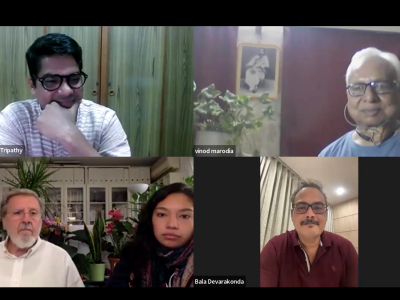 Ms. Swetapadma Pati (Member, Eager to Force Ahead, Odisha) focussed on India’s impact on the world is profound and far-reaching, extending beyond conventional measures. At the heart of its contributions lies spirituality, a cornerstone of its global influence. As Sri Aurobindo insightfully observes that India’s spiritual gift to the world has already begun and it is India which shall show light to the whole world. She further highlighted that this concept also applies to democracy. True democracy arises when we are guided by our deepest selves—the soul. Whether in government, society, or education, when our actions align with this deeper purpose, they fulfill their true potential.
Ms. Swetapadma Pati (Member, Eager to Force Ahead, Odisha) focussed on India’s impact on the world is profound and far-reaching, extending beyond conventional measures. At the heart of its contributions lies spirituality, a cornerstone of its global influence. As Sri Aurobindo insightfully observes that India’s spiritual gift to the world has already begun and it is India which shall show light to the whole world. She further highlighted that this concept also applies to democracy. True democracy arises when we are guided by our deepest selves—the soul. Whether in government, society, or education, when our actions align with this deeper purpose, they fulfill their true potential.
Dr Aniket Mohapatra (Academician, New Alipore College, University of Calcutta, West Bengal) mentioned that
India is the motherland of democracy. Ancient gaṇarājya were in India. He said that from the Vedic period the concept and the implementation of the democratic structure were initiated here too. Licchavis, Vajjis, Videhas, Nāyas, Mallas, Sakyas, Koliyas practiced non-monarchical government operations in the ancient India. Also few other lesser known people were in same operations ; like Moriyas of Pipphalivana, Bulis of Allakappa, Bhaggas of Sumsumaragiri, Kalamas of Kesaputta. In Veda there are two units described, Sabhā and Samiti. These are the pivotal and core components of the Indian democratic view and vision. He further said that in this twenty first century India is the largest democracy of the world with an ancient essence. The base of the essence is Dharma. Rishi Aurobindo emphasized on Dharma as a foundation of Indian democratic practice.
The Vedas are considered the foundational texts, and the idea of democracy can be traced back to them, according to Dr. Biswaranjan Rath, the founder of the JagadGuru Yoga Bharat Foundation in Odisha. He brought up the idea of democracy as seen in numerous holy texts, including the Ramayana and Mahabharat. He spoke of the growth of spiritual democracy, equality, and liberty as paths that can take humanity toward a more expansive and sublime human spirit. He said that India is home to the country’s largest democracy and that humanity may be significantly shaped by the ideas of Vasudhaiva Kutumbkam.
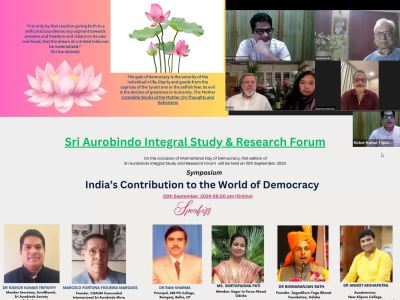 At the end subsequent discussion held by the participants of the symposium.
At the end subsequent discussion held by the participants of the symposium.
A trifling unit in a boundless plan
Amidst the enormous insignificance
Of the unpeopled cosmos’ fire-whirl dance,
Earth, as by accident, engendered man,
A creature of his own grey ignorance,
A mind half shadow and half gleam, a breath
That wrestles, captive in a world of death,
To live some lame brief years. Yet his advance,
Attempt of a divinity within,
A consciousness in the inconscient Night,
To realise its own supernal Light,
Confronts the ruthless forces of the Unseen.
Aspiring to godhead from insensible clay
He travels slow-footed towards the eternal day.
By Sri Aurobindo
